Tourism and Hospitality Management Report: Sector Overview
VerifiedAdded on 2023/01/19
|8
|2052
|81
Report
AI Summary
This report provides a comprehensive overview of the tourism and hospitality industry, focusing on the Australian market. It delves into the operational characteristics of hotels and resorts, exploring the impact of Airbnb and themed restaurants on the sector. The report examines the evolution of customer service, emphasizing its crucial role in the industry's success. Key topics include the influence of Airbnb on traditional hospitality models, the importance of customer experience in themed restaurants, and the broader trends shaping the industry. The analysis covers various aspects of the industry, from service techniques at the 'Moment of Truth' to the significance of customer care and the challenges of diversity in a globalized context. The report also references key academic sources, providing a well-rounded perspective on the current state and future directions of tourism and hospitality management.
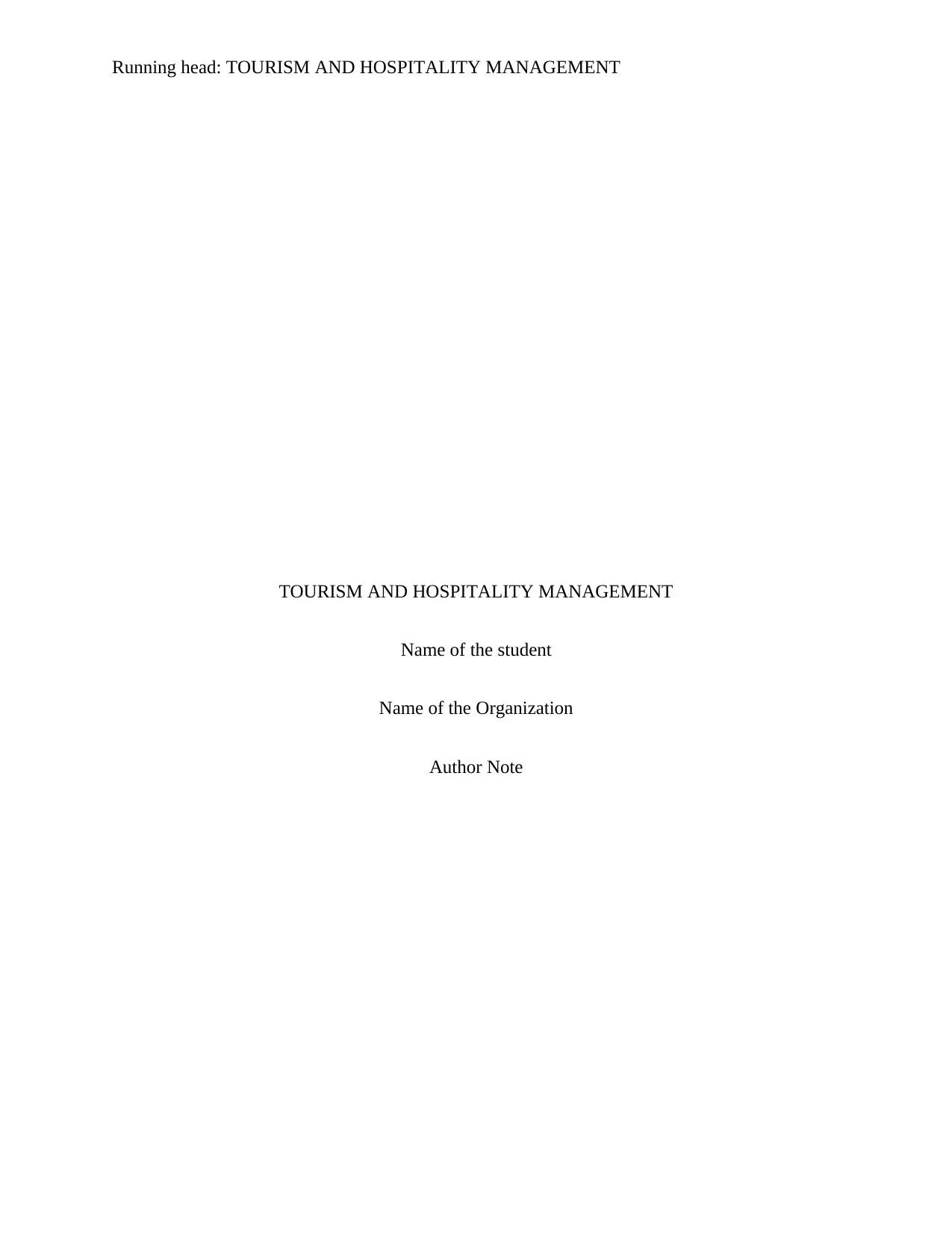
Running head: TOURISM AND HOSPITALITY MANAGEMENT
TOURISM AND HOSPITALITY MANAGEMENT
Name of the student
Name of the Organization
Author Note
TOURISM AND HOSPITALITY MANAGEMENT
Name of the student
Name of the Organization
Author Note
Paraphrase This Document
Need a fresh take? Get an instant paraphrase of this document with our AI Paraphraser
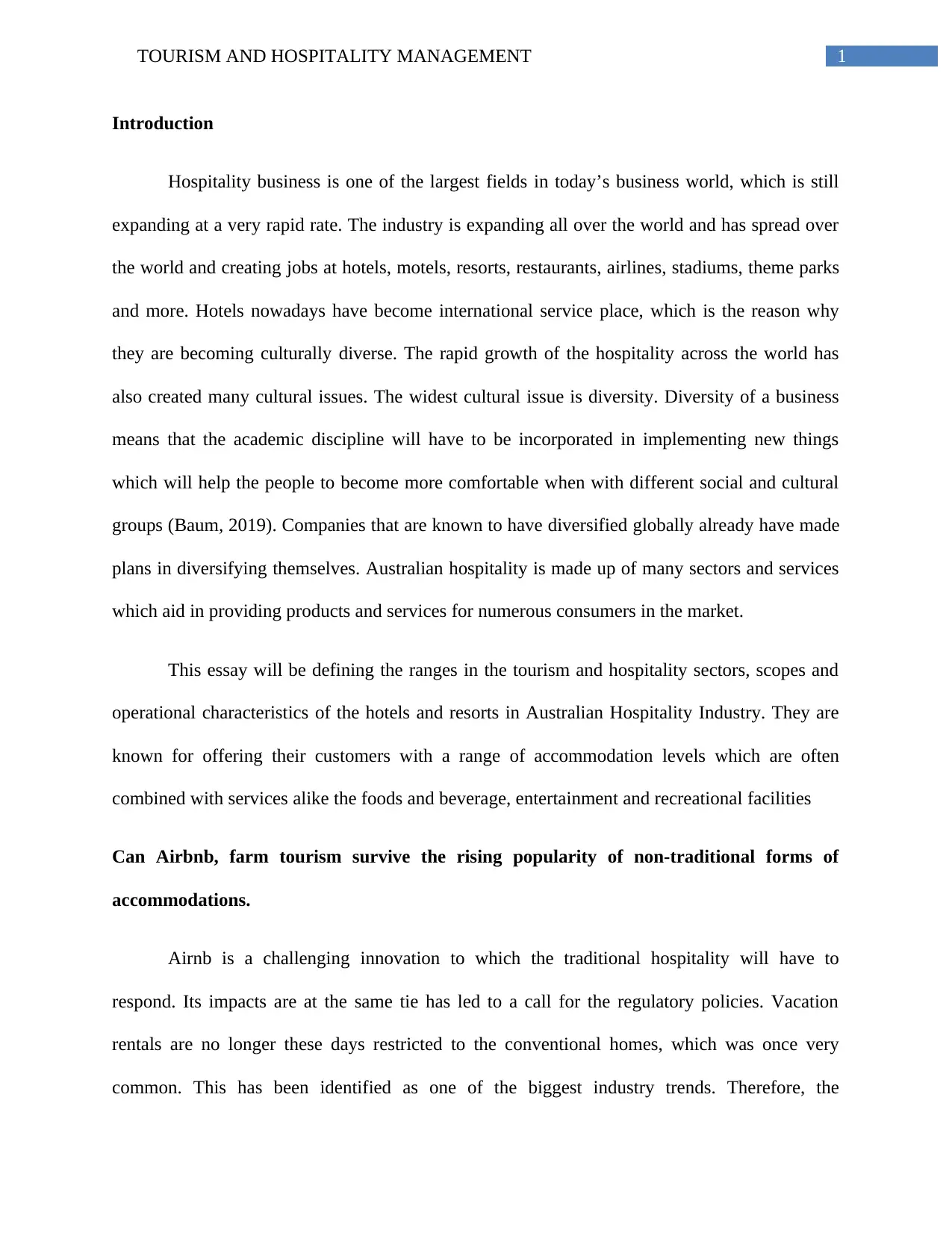
1TOURISM AND HOSPITALITY MANAGEMENT
Introduction
Hospitality business is one of the largest fields in today’s business world, which is still
expanding at a very rapid rate. The industry is expanding all over the world and has spread over
the world and creating jobs at hotels, motels, resorts, restaurants, airlines, stadiums, theme parks
and more. Hotels nowadays have become international service place, which is the reason why
they are becoming culturally diverse. The rapid growth of the hospitality across the world has
also created many cultural issues. The widest cultural issue is diversity. Diversity of a business
means that the academic discipline will have to be incorporated in implementing new things
which will help the people to become more comfortable when with different social and cultural
groups (Baum, 2019). Companies that are known to have diversified globally already have made
plans in diversifying themselves. Australian hospitality is made up of many sectors and services
which aid in providing products and services for numerous consumers in the market.
This essay will be defining the ranges in the tourism and hospitality sectors, scopes and
operational characteristics of the hotels and resorts in Australian Hospitality Industry. They are
known for offering their customers with a range of accommodation levels which are often
combined with services alike the foods and beverage, entertainment and recreational facilities
Can Airbnb, farm tourism survive the rising popularity of non-traditional forms of
accommodations.
Airnb is a challenging innovation to which the traditional hospitality will have to
respond. Its impacts are at the same tie has led to a call for the regulatory policies. Vacation
rentals are no longer these days restricted to the conventional homes, which was once very
common. This has been identified as one of the biggest industry trends. Therefore, the
Introduction
Hospitality business is one of the largest fields in today’s business world, which is still
expanding at a very rapid rate. The industry is expanding all over the world and has spread over
the world and creating jobs at hotels, motels, resorts, restaurants, airlines, stadiums, theme parks
and more. Hotels nowadays have become international service place, which is the reason why
they are becoming culturally diverse. The rapid growth of the hospitality across the world has
also created many cultural issues. The widest cultural issue is diversity. Diversity of a business
means that the academic discipline will have to be incorporated in implementing new things
which will help the people to become more comfortable when with different social and cultural
groups (Baum, 2019). Companies that are known to have diversified globally already have made
plans in diversifying themselves. Australian hospitality is made up of many sectors and services
which aid in providing products and services for numerous consumers in the market.
This essay will be defining the ranges in the tourism and hospitality sectors, scopes and
operational characteristics of the hotels and resorts in Australian Hospitality Industry. They are
known for offering their customers with a range of accommodation levels which are often
combined with services alike the foods and beverage, entertainment and recreational facilities
Can Airbnb, farm tourism survive the rising popularity of non-traditional forms of
accommodations.
Airnb is a challenging innovation to which the traditional hospitality will have to
respond. Its impacts are at the same tie has led to a call for the regulatory policies. Vacation
rentals are no longer these days restricted to the conventional homes, which was once very
common. This has been identified as one of the biggest industry trends. Therefore, the
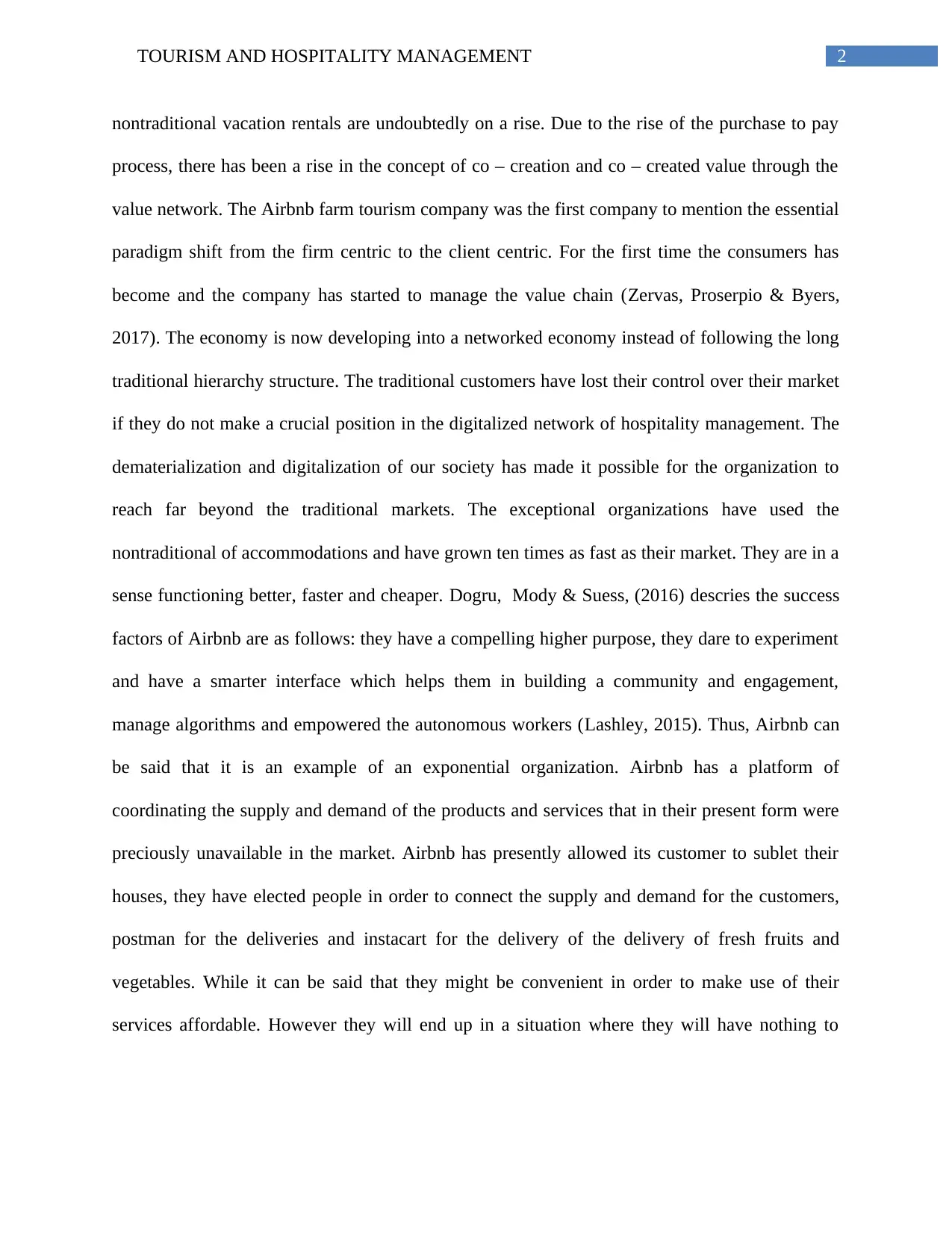
2TOURISM AND HOSPITALITY MANAGEMENT
nontraditional vacation rentals are undoubtedly on a rise. Due to the rise of the purchase to pay
process, there has been a rise in the concept of co – creation and co – created value through the
value network. The Airbnb farm tourism company was the first company to mention the essential
paradigm shift from the firm centric to the client centric. For the first time the consumers has
become and the company has started to manage the value chain (Zervas, Proserpio & Byers,
2017). The economy is now developing into a networked economy instead of following the long
traditional hierarchy structure. The traditional customers have lost their control over their market
if they do not make a crucial position in the digitalized network of hospitality management. The
dematerialization and digitalization of our society has made it possible for the organization to
reach far beyond the traditional markets. The exceptional organizations have used the
nontraditional of accommodations and have grown ten times as fast as their market. They are in a
sense functioning better, faster and cheaper. Dogru, Mody & Suess, (2016) descries the success
factors of Airbnb are as follows: they have a compelling higher purpose, they dare to experiment
and have a smarter interface which helps them in building a community and engagement,
manage algorithms and empowered the autonomous workers (Lashley, 2015). Thus, Airbnb can
be said that it is an example of an exponential organization. Airbnb has a platform of
coordinating the supply and demand of the products and services that in their present form were
preciously unavailable in the market. Airbnb has presently allowed its customer to sublet their
houses, they have elected people in order to connect the supply and demand for the customers,
postman for the deliveries and instacart for the delivery of the delivery of fresh fruits and
vegetables. While it can be said that they might be convenient in order to make use of their
services affordable. However they will end up in a situation where they will have nothing to
nontraditional vacation rentals are undoubtedly on a rise. Due to the rise of the purchase to pay
process, there has been a rise in the concept of co – creation and co – created value through the
value network. The Airbnb farm tourism company was the first company to mention the essential
paradigm shift from the firm centric to the client centric. For the first time the consumers has
become and the company has started to manage the value chain (Zervas, Proserpio & Byers,
2017). The economy is now developing into a networked economy instead of following the long
traditional hierarchy structure. The traditional customers have lost their control over their market
if they do not make a crucial position in the digitalized network of hospitality management. The
dematerialization and digitalization of our society has made it possible for the organization to
reach far beyond the traditional markets. The exceptional organizations have used the
nontraditional of accommodations and have grown ten times as fast as their market. They are in a
sense functioning better, faster and cheaper. Dogru, Mody & Suess, (2016) descries the success
factors of Airbnb are as follows: they have a compelling higher purpose, they dare to experiment
and have a smarter interface which helps them in building a community and engagement,
manage algorithms and empowered the autonomous workers (Lashley, 2015). Thus, Airbnb can
be said that it is an example of an exponential organization. Airbnb has a platform of
coordinating the supply and demand of the products and services that in their present form were
preciously unavailable in the market. Airbnb has presently allowed its customer to sublet their
houses, they have elected people in order to connect the supply and demand for the customers,
postman for the deliveries and instacart for the delivery of the delivery of fresh fruits and
vegetables. While it can be said that they might be convenient in order to make use of their
services affordable. However they will end up in a situation where they will have nothing to
⊘ This is a preview!⊘
Do you want full access?
Subscribe today to unlock all pages.

Trusted by 1+ million students worldwide
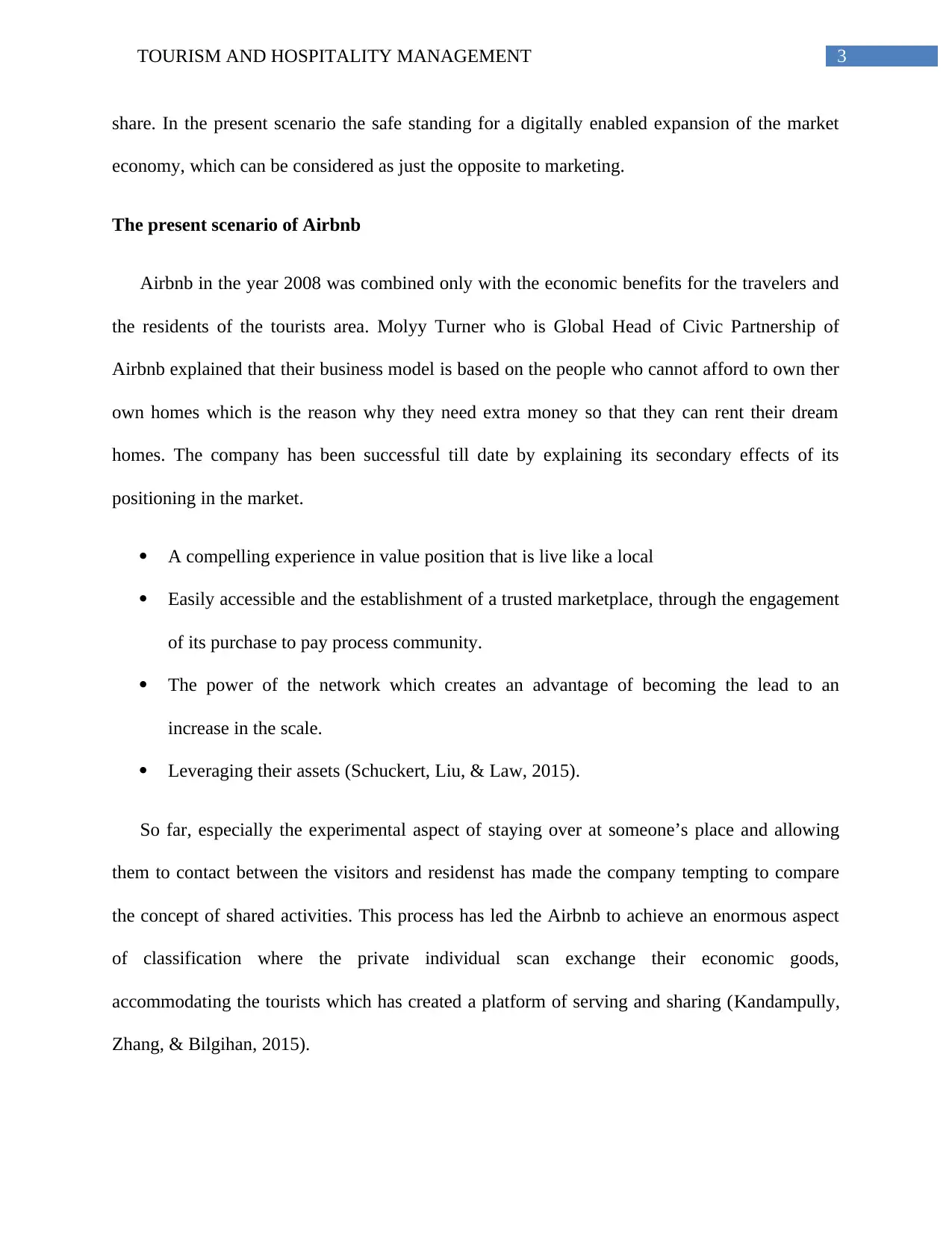
3TOURISM AND HOSPITALITY MANAGEMENT
share. In the present scenario the safe standing for a digitally enabled expansion of the market
economy, which can be considered as just the opposite to marketing.
The present scenario of Airbnb
Airbnb in the year 2008 was combined only with the economic benefits for the travelers and
the residents of the tourists area. Molyy Turner who is Global Head of Civic Partnership of
Airbnb explained that their business model is based on the people who cannot afford to own ther
own homes which is the reason why they need extra money so that they can rent their dream
homes. The company has been successful till date by explaining its secondary effects of its
positioning in the market.
A compelling experience in value position that is live like a local
Easily accessible and the establishment of a trusted marketplace, through the engagement
of its purchase to pay process community.
The power of the network which creates an advantage of becoming the lead to an
increase in the scale.
Leveraging their assets (Schuckert, Liu, & Law, 2015).
So far, especially the experimental aspect of staying over at someone’s place and allowing
them to contact between the visitors and residenst has made the company tempting to compare
the concept of shared activities. This process has led the Airbnb to achieve an enormous aspect
of classification where the private individual scan exchange their economic goods,
accommodating the tourists which has created a platform of serving and sharing (Kandampully,
Zhang, & Bilgihan, 2015).
share. In the present scenario the safe standing for a digitally enabled expansion of the market
economy, which can be considered as just the opposite to marketing.
The present scenario of Airbnb
Airbnb in the year 2008 was combined only with the economic benefits for the travelers and
the residents of the tourists area. Molyy Turner who is Global Head of Civic Partnership of
Airbnb explained that their business model is based on the people who cannot afford to own ther
own homes which is the reason why they need extra money so that they can rent their dream
homes. The company has been successful till date by explaining its secondary effects of its
positioning in the market.
A compelling experience in value position that is live like a local
Easily accessible and the establishment of a trusted marketplace, through the engagement
of its purchase to pay process community.
The power of the network which creates an advantage of becoming the lead to an
increase in the scale.
Leveraging their assets (Schuckert, Liu, & Law, 2015).
So far, especially the experimental aspect of staying over at someone’s place and allowing
them to contact between the visitors and residenst has made the company tempting to compare
the concept of shared activities. This process has led the Airbnb to achieve an enormous aspect
of classification where the private individual scan exchange their economic goods,
accommodating the tourists which has created a platform of serving and sharing (Kandampully,
Zhang, & Bilgihan, 2015).
Paraphrase This Document
Need a fresh take? Get an instant paraphrase of this document with our AI Paraphraser
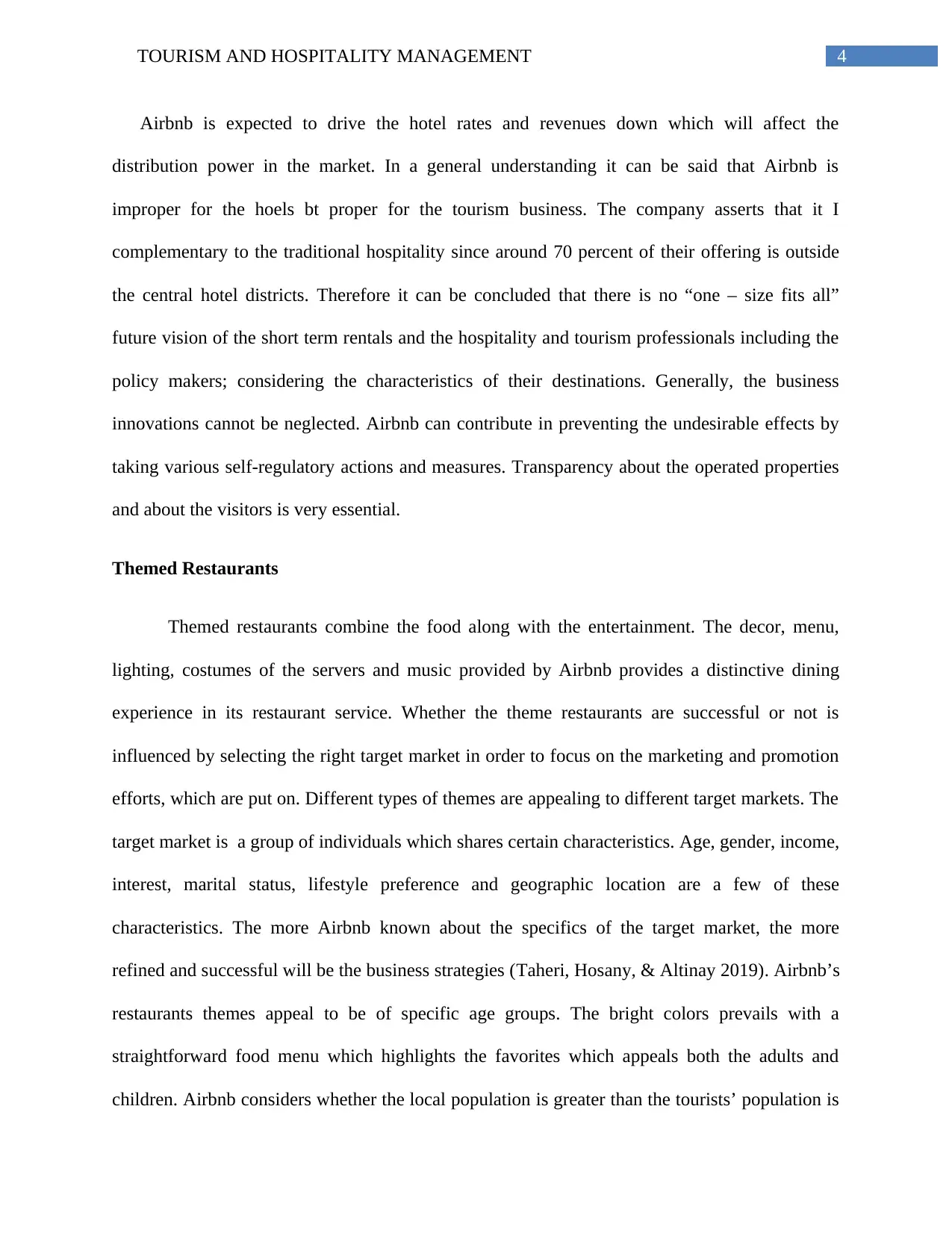
4TOURISM AND HOSPITALITY MANAGEMENT
Airbnb is expected to drive the hotel rates and revenues down which will affect the
distribution power in the market. In a general understanding it can be said that Airbnb is
improper for the hoels bt proper for the tourism business. The company asserts that it I
complementary to the traditional hospitality since around 70 percent of their offering is outside
the central hotel districts. Therefore it can be concluded that there is no “one – size fits all”
future vision of the short term rentals and the hospitality and tourism professionals including the
policy makers; considering the characteristics of their destinations. Generally, the business
innovations cannot be neglected. Airbnb can contribute in preventing the undesirable effects by
taking various self-regulatory actions and measures. Transparency about the operated properties
and about the visitors is very essential.
Themed Restaurants
Themed restaurants combine the food along with the entertainment. The decor, menu,
lighting, costumes of the servers and music provided by Airbnb provides a distinctive dining
experience in its restaurant service. Whether the theme restaurants are successful or not is
influenced by selecting the right target market in order to focus on the marketing and promotion
efforts, which are put on. Different types of themes are appealing to different target markets. The
target market is a group of individuals which shares certain characteristics. Age, gender, income,
interest, marital status, lifestyle preference and geographic location are a few of these
characteristics. The more Airbnb known about the specifics of the target market, the more
refined and successful will be the business strategies (Taheri, Hosany, & Altinay 2019). Airbnb’s
restaurants themes appeal to be of specific age groups. The bright colors prevails with a
straightforward food menu which highlights the favorites which appeals both the adults and
children. Airbnb considers whether the local population is greater than the tourists’ population is
Airbnb is expected to drive the hotel rates and revenues down which will affect the
distribution power in the market. In a general understanding it can be said that Airbnb is
improper for the hoels bt proper for the tourism business. The company asserts that it I
complementary to the traditional hospitality since around 70 percent of their offering is outside
the central hotel districts. Therefore it can be concluded that there is no “one – size fits all”
future vision of the short term rentals and the hospitality and tourism professionals including the
policy makers; considering the characteristics of their destinations. Generally, the business
innovations cannot be neglected. Airbnb can contribute in preventing the undesirable effects by
taking various self-regulatory actions and measures. Transparency about the operated properties
and about the visitors is very essential.
Themed Restaurants
Themed restaurants combine the food along with the entertainment. The decor, menu,
lighting, costumes of the servers and music provided by Airbnb provides a distinctive dining
experience in its restaurant service. Whether the theme restaurants are successful or not is
influenced by selecting the right target market in order to focus on the marketing and promotion
efforts, which are put on. Different types of themes are appealing to different target markets. The
target market is a group of individuals which shares certain characteristics. Age, gender, income,
interest, marital status, lifestyle preference and geographic location are a few of these
characteristics. The more Airbnb known about the specifics of the target market, the more
refined and successful will be the business strategies (Taheri, Hosany, & Altinay 2019). Airbnb’s
restaurants themes appeal to be of specific age groups. The bright colors prevails with a
straightforward food menu which highlights the favorites which appeals both the adults and
children. Airbnb considers whether the local population is greater than the tourists’ population is
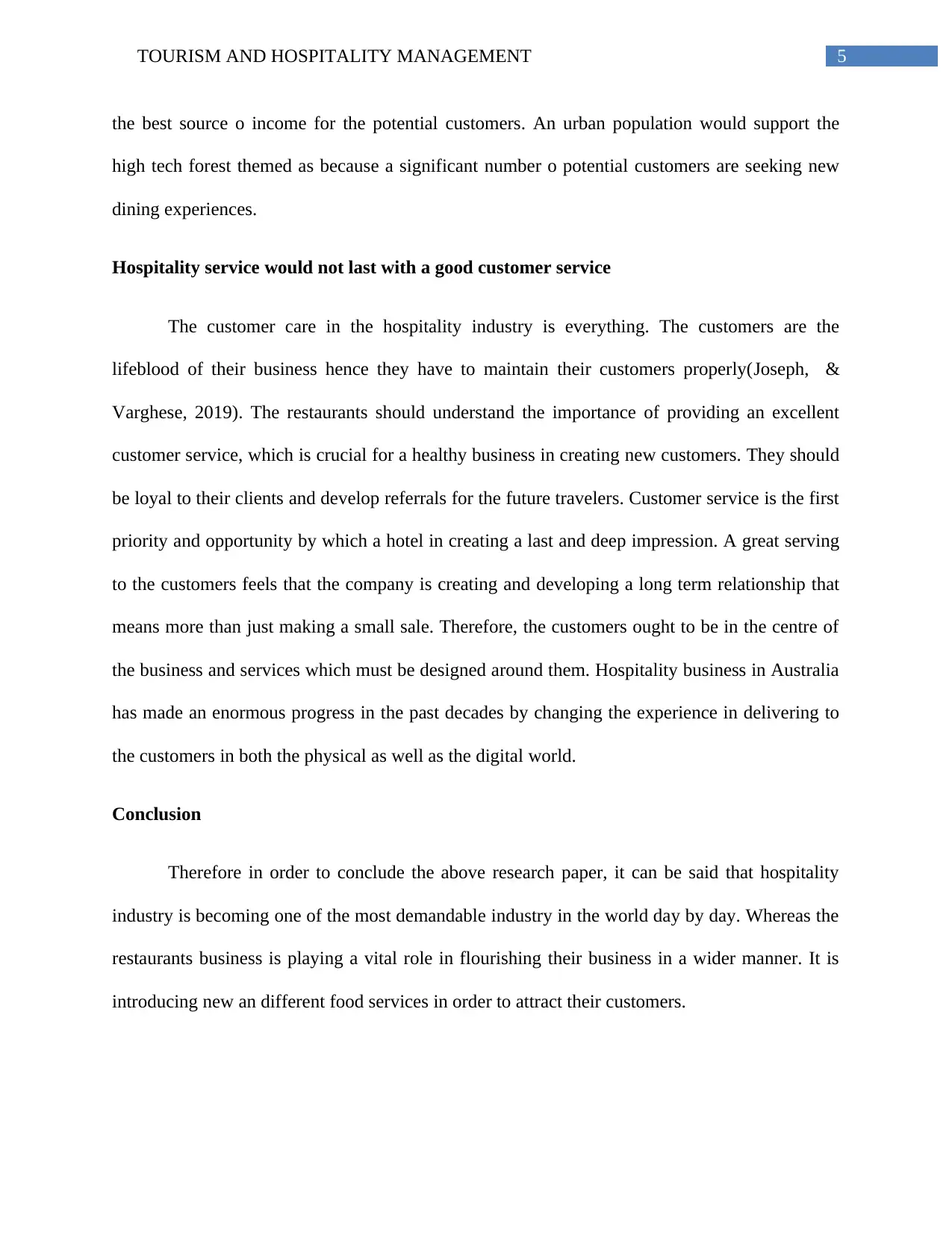
5TOURISM AND HOSPITALITY MANAGEMENT
the best source o income for the potential customers. An urban population would support the
high tech forest themed as because a significant number o potential customers are seeking new
dining experiences.
Hospitality service would not last with a good customer service
The customer care in the hospitality industry is everything. The customers are the
lifeblood of their business hence they have to maintain their customers properly(Joseph, &
Varghese, 2019). The restaurants should understand the importance of providing an excellent
customer service, which is crucial for a healthy business in creating new customers. They should
be loyal to their clients and develop referrals for the future travelers. Customer service is the first
priority and opportunity by which a hotel in creating a last and deep impression. A great serving
to the customers feels that the company is creating and developing a long term relationship that
means more than just making a small sale. Therefore, the customers ought to be in the centre of
the business and services which must be designed around them. Hospitality business in Australia
has made an enormous progress in the past decades by changing the experience in delivering to
the customers in both the physical as well as the digital world.
Conclusion
Therefore in order to conclude the above research paper, it can be said that hospitality
industry is becoming one of the most demandable industry in the world day by day. Whereas the
restaurants business is playing a vital role in flourishing their business in a wider manner. It is
introducing new an different food services in order to attract their customers.
the best source o income for the potential customers. An urban population would support the
high tech forest themed as because a significant number o potential customers are seeking new
dining experiences.
Hospitality service would not last with a good customer service
The customer care in the hospitality industry is everything. The customers are the
lifeblood of their business hence they have to maintain their customers properly(Joseph, &
Varghese, 2019). The restaurants should understand the importance of providing an excellent
customer service, which is crucial for a healthy business in creating new customers. They should
be loyal to their clients and develop referrals for the future travelers. Customer service is the first
priority and opportunity by which a hotel in creating a last and deep impression. A great serving
to the customers feels that the company is creating and developing a long term relationship that
means more than just making a small sale. Therefore, the customers ought to be in the centre of
the business and services which must be designed around them. Hospitality business in Australia
has made an enormous progress in the past decades by changing the experience in delivering to
the customers in both the physical as well as the digital world.
Conclusion
Therefore in order to conclude the above research paper, it can be said that hospitality
industry is becoming one of the most demandable industry in the world day by day. Whereas the
restaurants business is playing a vital role in flourishing their business in a wider manner. It is
introducing new an different food services in order to attract their customers.
⊘ This is a preview!⊘
Do you want full access?
Subscribe today to unlock all pages.

Trusted by 1+ million students worldwide
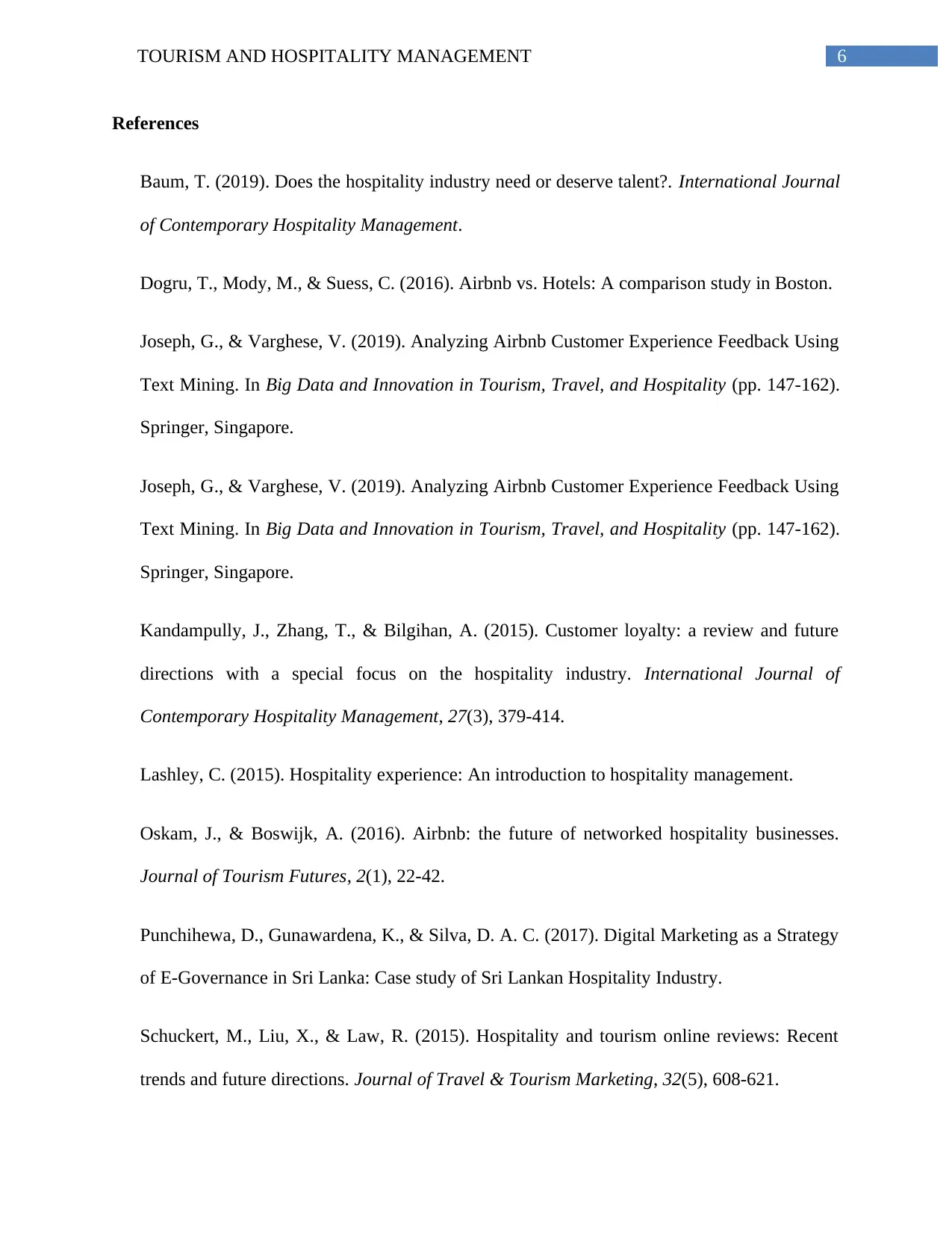
6TOURISM AND HOSPITALITY MANAGEMENT
References
Baum, T. (2019). Does the hospitality industry need or deserve talent?. International Journal
of Contemporary Hospitality Management.
Dogru, T., Mody, M., & Suess, C. (2016). Airbnb vs. Hotels: A comparison study in Boston.
Joseph, G., & Varghese, V. (2019). Analyzing Airbnb Customer Experience Feedback Using
Text Mining. In Big Data and Innovation in Tourism, Travel, and Hospitality (pp. 147-162).
Springer, Singapore.
Joseph, G., & Varghese, V. (2019). Analyzing Airbnb Customer Experience Feedback Using
Text Mining. In Big Data and Innovation in Tourism, Travel, and Hospitality (pp. 147-162).
Springer, Singapore.
Kandampully, J., Zhang, T., & Bilgihan, A. (2015). Customer loyalty: a review and future
directions with a special focus on the hospitality industry. International Journal of
Contemporary Hospitality Management, 27(3), 379-414.
Lashley, C. (2015). Hospitality experience: An introduction to hospitality management.
Oskam, J., & Boswijk, A. (2016). Airbnb: the future of networked hospitality businesses.
Journal of Tourism Futures, 2(1), 22-42.
Punchihewa, D., Gunawardena, K., & Silva, D. A. C. (2017). Digital Marketing as a Strategy
of E-Governance in Sri Lanka: Case study of Sri Lankan Hospitality Industry.
Schuckert, M., Liu, X., & Law, R. (2015). Hospitality and tourism online reviews: Recent
trends and future directions. Journal of Travel & Tourism Marketing, 32(5), 608-621.
References
Baum, T. (2019). Does the hospitality industry need or deserve talent?. International Journal
of Contemporary Hospitality Management.
Dogru, T., Mody, M., & Suess, C. (2016). Airbnb vs. Hotels: A comparison study in Boston.
Joseph, G., & Varghese, V. (2019). Analyzing Airbnb Customer Experience Feedback Using
Text Mining. In Big Data and Innovation in Tourism, Travel, and Hospitality (pp. 147-162).
Springer, Singapore.
Joseph, G., & Varghese, V. (2019). Analyzing Airbnb Customer Experience Feedback Using
Text Mining. In Big Data and Innovation in Tourism, Travel, and Hospitality (pp. 147-162).
Springer, Singapore.
Kandampully, J., Zhang, T., & Bilgihan, A. (2015). Customer loyalty: a review and future
directions with a special focus on the hospitality industry. International Journal of
Contemporary Hospitality Management, 27(3), 379-414.
Lashley, C. (2015). Hospitality experience: An introduction to hospitality management.
Oskam, J., & Boswijk, A. (2016). Airbnb: the future of networked hospitality businesses.
Journal of Tourism Futures, 2(1), 22-42.
Punchihewa, D., Gunawardena, K., & Silva, D. A. C. (2017). Digital Marketing as a Strategy
of E-Governance in Sri Lanka: Case study of Sri Lankan Hospitality Industry.
Schuckert, M., Liu, X., & Law, R. (2015). Hospitality and tourism online reviews: Recent
trends and future directions. Journal of Travel & Tourism Marketing, 32(5), 608-621.
Paraphrase This Document
Need a fresh take? Get an instant paraphrase of this document with our AI Paraphraser
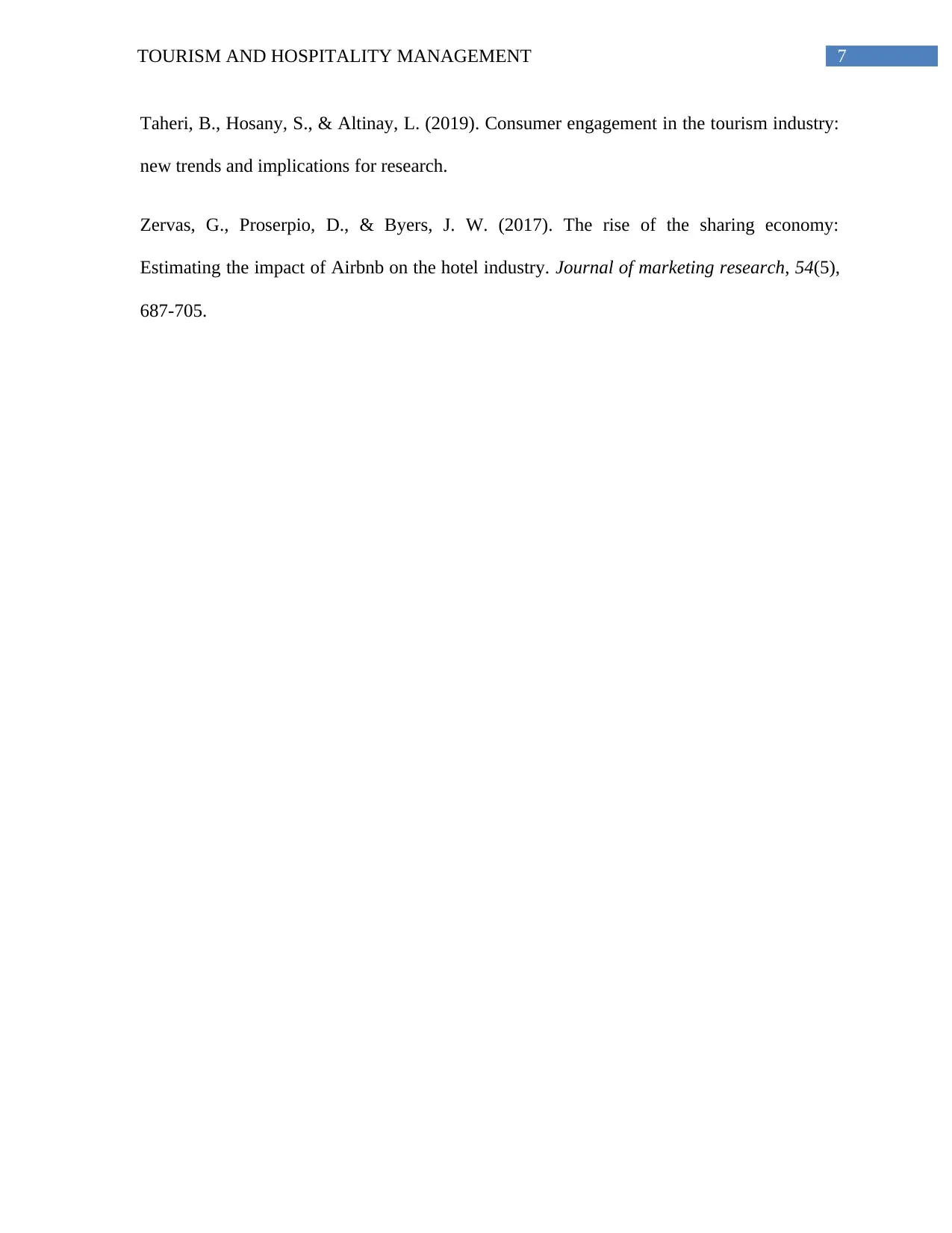
7TOURISM AND HOSPITALITY MANAGEMENT
Taheri, B., Hosany, S., & Altinay, L. (2019). Consumer engagement in the tourism industry:
new trends and implications for research.
Zervas, G., Proserpio, D., & Byers, J. W. (2017). The rise of the sharing economy:
Estimating the impact of Airbnb on the hotel industry. Journal of marketing research, 54(5),
687-705.
Taheri, B., Hosany, S., & Altinay, L. (2019). Consumer engagement in the tourism industry:
new trends and implications for research.
Zervas, G., Proserpio, D., & Byers, J. W. (2017). The rise of the sharing economy:
Estimating the impact of Airbnb on the hotel industry. Journal of marketing research, 54(5),
687-705.
1 out of 8
Related Documents
Your All-in-One AI-Powered Toolkit for Academic Success.
+13062052269
info@desklib.com
Available 24*7 on WhatsApp / Email
![[object Object]](/_next/static/media/star-bottom.7253800d.svg)
Unlock your academic potential
Copyright © 2020–2026 A2Z Services. All Rights Reserved. Developed and managed by ZUCOL.





